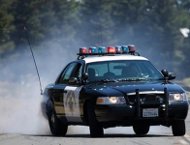Article from: www.thenewspaper.com/news/30/3000.asp
12/24/2009
California: Verdict of Evading Police Pursuit Upheld
California Court of Appeal rules once a police pursuit starts, it does not end.
 A three-judge panel of California Court of Appeal last week ruled that a driver can be charged with fleeing police even if the pursuing patrol car has shut off its emergency lights and siren. The court made its decision in the case of Steven Allan Copass who was convicted of evading the police on his motorcycle at high speeds following a February 16, 2008 incident.
A three-judge panel of California Court of Appeal last week ruled that a driver can be charged with fleeing police even if the pursuing patrol car has shut off its emergency lights and siren. The court made its decision in the case of Steven Allan Copass who was convicted of evading the police on his motorcycle at high speeds following a February 16, 2008 incident.
Copass was spotted by a California Highway Patrol (CHP) speed trap airplane on that day. Officer Chris Warren had been watching from above as drivers sped down Highway 46 in San Luis Obispo County. Warren would use his radio to call hidden, ground-based CHP units to pull over and the accused and issue the citations. After Warren told Officer Scott Koolman that a speeding motorcyclist was headed his way, Koolman claimed his radar displayed a reading of 91 MPH. Koolman motioned the rider to pull over.
Copass initially complied, but as Koolman approached on foot, Copass took off at high speed. Koolman himself exceeded 100 MPH during the pursuit. Eventually, Koolman lost sight of the motorcycle and shut off his emergency lights. Within five minutes, however, Warren reacquired the motorcycle from above. When Koolman approached in his cruiser, lights off, Copass again took off at high speed.
In an attempt to get away, Copass made a turn across a double-yellow line onto a side road, but Koolman eventually caught up and was able to block Copass. The trial judge imposed a heavy sentence of three years in jail and a $600 fine, with one of the three years being an "enhancement" of the sentence because Copass had fled a pursuing police car "with wanton disregard for the safety of others."
Copass argued that it was absurd for him to be sentenced to an extra year in jail simply because he had failed to yield to oncoming traffic when he pulled away from Koolman's cruiser. Under state law, a maximum of one year can be added to the sentence if three traffic violations occur while fleeing a police officer. Copass contended that Koolman had broken off the pursuit when those three violations occurred. Under state law, a driver is not considered to be "fleeing" a police officer unless the police car has both its lights and sirens active.
The appeals court did not buy this line of reasoning.
"For several reasons, we reject Copass's contentions," Presiding Judge Arthur Gilbert wrote for the court. "Although Koolman turned off his emergency lights for the five minutes that he lost sight of Copass, there was but one pursuit. At the inception of the pursuit, Koolman activated his emergency lights."
The court upheld the verdict imposed on Copass, whose history of serious traffic violations contributed to the harsh sentence.
A copy of the decision is available in a 25k PDF file at the source link below.
Source: California v. Copass (Court of Appeal, State of California, 12/14/2009)
Permanent Link for this item
Return to Front Page
 A three-judge panel of California Court of Appeal last week ruled that a driver can be charged with fleeing police even if the pursuing patrol car has shut off its emergency lights and siren. The court made its decision in the case of Steven Allan Copass who was convicted of evading the police on his motorcycle at high speeds following a February 16, 2008 incident.
A three-judge panel of California Court of Appeal last week ruled that a driver can be charged with fleeing police even if the pursuing patrol car has shut off its emergency lights and siren. The court made its decision in the case of Steven Allan Copass who was convicted of evading the police on his motorcycle at high speeds following a February 16, 2008 incident.